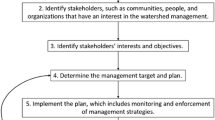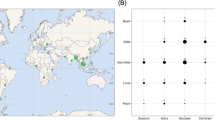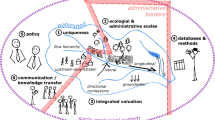Abstract
The paper proposes an analysis of the social–ecological resilience of the Limarí Basin, an agriculture-intensive dryland in the north of Chile, featuring one of the most innovative market-based water managements and the most active water rights market in the country, but concurrently affected by an ongoing water stress situation. The Chilean water market, one of the main examples of the application of neoliberal policies in water management, has received mixed appraisals although, at present, few empirical studies evaluate the social and environmental conditions associated with their operation. This paper, on the contrary, maintains the necessity to assess the capacity of market-based models to face situations of water stress, particularly since mega-drought phenomena are projected to become a recurring and increasing problem during the following decades because of climate change. The study offers a mixed bottom-up and top-down qualitative empirical analysis of how the Chilean water market operates, providing relevant insights into four dimensions of the social–ecological resilience of the watershed: redundancy, diversity and flexibility; connectivity, collaboration and collective action; social–ecological memory and learning; self-organization and governance of system changes. The conclusion is that water scarcity is self-produced: despite the flexibility provided by market-based water management, the combined effect of strong deregulation, of the absence of territorial planning and integrated management of water resources, and of short-term attitudes and generalized mistrust, has led the system to the critical situation it is now facing.


Similar content being viewed by others
Notes
Respectively, Laws No. 20.099, 20.304 and 20.417. To access the full text of any of the norms mentioned here: https://www.leychile.cl/.
References
Aitken, D., Rivera, D., Godoy-Faúndez, A., & Holzapfel, E. (2016). Water scarcity and the impact of the mining and agricultural sectors in Chile. Sustainability,8, 128. https://doi.org/10.3390/su8020128.
Arnold, R., Troost, C., & Berger, T. (2015). Water resources research. Water Resources Research,51, 648–668. https://doi.org/10.1002/2014WR015382.
Bauer, C. (2010). Dams and markets: Rivers and electric power in Chile. Natural Resources Journal,49(3–4), 583–651.
Bauer, C. (2015). Water conflicts and entrenched governance problems in Chile’s market model. Water Alternatives,8(2), 147–172.
Bodin, P., & Wiman, B. (2004). Resilience and other stability concepts in ecology: Notes on their origins, Validity and usefulness. ESS Bulletin,2(2), 33–43.
Boelens, R., Hoogesteger, J., Swyngedouw, E., Vos, J., & Wester, P. (2016). Hydrosocial territories: A political ecology perspective. Water International,41(1), 1–14. https://doi.org/10.1080/02508060.2016.1134898.
Boisier, J., Rondanelli, R., Garreaud, R., & Muñoz, F. (2016). Anthropogenic and natural contributions to the Southeast Pacific precipitation decline and recent megadrought in central Chile. Geophysical Research Letters,43(1), 413–421. https://doi.org/10.1002/2015gl067265.
CEPAL. (2009). La economía del cambio climático en Chile. Santiago: CEPAL.
CEPAL/BID. (2010). Cambio Climático una perspectiva regional. In Cumbre de la Unidad de América Latina y el Caribe. Riviera Maya (México), 22nd–23rd February, 2010.
Christmann, G., Ibert, O., Kilper, H., Moss, T. (2012). Vulnerability and resilience from a socio-spatial perspective. Towards a theoretical framework. Working Paper 45, Leibniz-Institut für Regionalentwicklung und Strukturplanung eV (IRS).
Clarvis, M. H., & Allan, A. (2014). Adaptive capacity in a Chilean context: A questionable model for Latin America. Environmental Science & Policy,43, 78–90. https://doi.org/10.1016/j.envsci.2013.10.014.
CONAMA. (2008). Análisis de vulnerabilidad silvoagropecuaria en Chile frente a escenarios de cambio climático. Santiago: CONAMA.
Cosens, B. A., Gunderson, L., & Chaffin, B. C. (2018). Introduction to the special feature practicing panarchy: Assessing legal flexibility, ecological resilience, and adaptive governance in regional water systems experiencing rapid environmental change. Ecology and Society,23(1), 4. https://doi.org/10.5751/ES-09524-230104.
Costumero, R., Sánchez, J., García-Pedrero, A., Rivera, D., Lillo, M., Gonzalo-Martín, C., et al. (2017). Geography of legal water disputes in Chile. Journal of Maps,13(1), 7–13. https://doi.org/10.1080/17445647.2016.1252803.
CR2. (2015). La megasequía 2010–2015: Una lección para el futuro. Santiago: CR2—Centro de Ciencia del Clima y la Resilienca.
Cumming, G. (2011). Spatial resilience in social–ecological systems. Cape Town: Springer.
Delgado, L., Torres-Gómez, M., Tironi-Silva, A., & Marín, V. (2015). Estrategia de adaptación local al cambio climático para el acceso equitativo al agua en zonas rurales de Chile. América Latina hoy,69, 113–137.
Denzin, N., & Lincoln, Y. (2011). Handbook of qualitative research (4th ed.). Thousand Oaks: Sage Publications.
Díaz, R. (2008). El recurso hídrico: acceso, reglas y restricciones en zonas áridas, Cuenca del limarí. La Serena: Universidad de La Serena.
Donoso, G. (2003). Mercados de Agua: Estudio de Caso del Código de Aguas en Chile de 1981. Santiago: Pontificia Universidad Católica de Chile.
Doughty, C. A. (2016). Building climate change resilience through local cooperation: A Peruvian Andes case study. Regional Environmental Change,16(8), 2187–2197. https://doi.org/10.1007/s10113-015-0882-2.
Engle, N. (2011). Adaptive capacity and its assessment. Global Environmental Change,21(2), 647–656. https://doi.org/10.1016/j.gloenvcha.2011.01.019.
FAO. (2010). Gestión del Riesgo de sequía y otros eventos climáticos extremos en Chile. Santiago: FAO.
Favier, V., Falvey, M., Rabatel, A., Praderio, E., & López, D. (2009). Interpreting discrepancies between discharge and precipitation in high-altitude area of Chile’s Norte Chico region (26–32°S). Water Resources Research,45(2), W02424. https://doi.org/10.1029/2008WR006802.
Fernandez, S. (2014). Much Ado about minimum flows… Unpacking indicators to reveal water politics. Geoforum,57, 258–271. https://doi.org/10.1016/j.geoforum.2013.04.017.
Ferrando, F. (2002). Cuenca del Río Limarí, Chile Semiárido: Aspectos de la Oferta y Demanda de Agua. Rev Geogr Norte Gd,30, 23–44.
Folke, C. (2006). Resilience: The emergence of a perspective for social–ecological systems. Global Environmental Change,16(3), 253–267. https://doi.org/10.1016/j.gloenvcha.2006.04.002.
Folke, C. (2016). Resilience. Oxford research encyclopedia of environmental science. http://environmentalscience.oxfordre.com/view/10.1093/acrefore/9780199389414.001.0001/acrefore-9780199389414-e-8. Accessed 8 September, 2017.
Folke, C., Hahn, T., Olsson, P., & Norberg, J. (2005). Adaptive governance of social–ecological systems. Annual Review of Environment and Resources,30, 441–473. https://doi.org/10.1146/annurev.energy.30.050504.144511.
Frêne, C., Ojeda, G., Santibáñez, J., Donoso, C., Sanzana, J., Molina, C., et al. (2014). Agua en Chile: diagnósticos territoriales y propuestas para enfrentar la crisis hídrica. Aguas que has de beber, Santiago. http://bosquenativo.cl/wp-content/uploads/2016/01/agua_en_chile_propuestas_2014.pdf. Retrieved 4 June, 2018.
Fuster, R. (2006). Equidad en el acceso al agua en la agricultura. Evaluación del modelo chileno de gestión de las aguas: El caso de la cuenca del río Limarí. Barcelona: Universitat Autònoma de Barcelona/ICTA.
Galaz, V. (2004). Stealing from the poor? Game theory and the politics of water markets in Chile. Environmental Politics,13(2), 414–437.
Gallopin, G. (2006). Linkages between vulnerability, resilience, and adaptive capacity. Global Environmental Change,16(3), 293–303. https://doi.org/10.1016/j.gloenvcha.2006.02.004.
Gentes, I. (2007). Las aguas transadas. Estado de arte de las propiedades hidráulicas y del impacto del mercado de derechos de agua en Chile. Santiago de Chile: OXFAM.
Gotts, N. (2007). Resilience, panarchy, and world-systems analysis. Ecology and Society,12(1), 24–37.
Grafton, R. Q., Landry, C., Libecap, G. D., McGlennon, S., O’Brien, R. (2010). An integrated assessment of water markets: Australia, Chile, China, South Africa and the USA. National Bureau of Economic Research, Cambridge MA, Working Paper 16203. http://www.kysq.org/docs/Grafton%20et%20al%202010.pdf. Accessed 4 June, 2018.
Gunderson, L., & Holling, C. (2002). Panarchy: Understanding transformations in human and natural systems. Washington: Island Press.
Hadjigeorgalis, E. (2004). Comerciando con incertidumbre: Los mercados de agua en la agricultura chilena. Cuad Econ,41(122), 3–34. https://doi.org/10.4067/S0717-68212004012200001.
Haughton, G. (2002). Market making: Internationalisation and global water markets. Environment and Planning A,34, 791–807. https://doi.org/10.1068/a3426.
Hearne, R., & Donoso, G. (2014). Water markets in Chile: Are they meeting needs? In W. Easter & Q. Huang (Eds.), Water markets for the 21st century (pp. 103–126). Berlin: Springer.
Holling, C. (1973). Resilience and stability of ecological systems. Annual Reviews of Ecology and Systematics,4, 1–23.
Hurlbert, M., & Gupta, J. (2016). The adaptive capacity of institutions in Canada, Argentina, and Chile to droughts and floods. Regional Environmental Change,17(3), 865–877. https://doi.org/10.1007/s10113-016-1078-0.
Ifejika, C. (2013). Buffer capacity: Capturing a dimension of resilience to climate change in African smallholder agriculture. Regional Environmental Change,13(3), 521–535. https://doi.org/10.1007/s10113-012-0391-5.
INDH - Instituto Nacional de Derechos Humanos. (2016). Mapa de conflictos socioambientales en Chile 2015. http://bibliotecadigital.indh.cl/handle/123456789/989. Retrieved 4 June, 2018.
Jara-Rojas, R., Bravo-Ureta, B. E., & Díaz, J. (2012). Adoption of water conservation practices: A socioeconomic analysis of small-scale farmers in Central Chile. Agricultural Systems,110, 54–62. https://doi.org/10.1016/j.agsy.2012.03.008.
Karoly, D. (1989). Southern hemisphere circulation features associated with El Niño-Southern Oscillation events. Journal of Climate,2(11), 1239–1252.
Leon, A. (2008). Políticas macroeconómica y de promoción del riego y cambio climático en la montaña semi-árida de chile. Pirineos,163, 111–133. https://doi.org/10.3989/pirineos.2008.v163.26.
Linton, J. (2014). Modern water and its discontents: A history of hydrosocial renewal. WIREs Water,1, 111–120. https://doi.org/10.1002/wat2.1009.
Linton, J., & Budds, J. (2014). The hydrosocial cycle: Defining and mobilizing a relational-dialectical approach to water. Geoforum,57, 170–180. https://doi.org/10.1016/j.geoforum.2013.10.008.
Mantua, N., & Hare, S. (2002). The Pacific decadal oscillation. Journal of Oceanography,58(1), 35–44.
Mehta, L. (2014). Water and human development. World Development,59, 59–69. https://doi.org/10.1016/j.worlddev.2013.12.018.
Meza, F. (2013). Recent trends and ENSO influence on droughts in Northern Chile: An application of the Standardized Precipitation Evapotranspiration Index. Weather and Climate Extremes,1, 51–58. https://doi.org/10.1016/j.wace.2013.07.002.
Meza, F., Vicuna, S., Gironás, J., Poblete, D., Suárez, F., & Oertel, M. (2015). Water–food–energy nexus in Chile: The challenges due to global change in different regional contexts. Water International,40(5–6), 839–855. https://doi.org/10.1080/02508060.2015.1087797.
Meza, F., Wilks, D., Gurovich, L., & Bambach, N. (2012). Impacts of climate change on irrigated agriculture in the Maipo Basin, Chile: Reliability of water rights and changes in the demand for irrigation. Journal of Water Resources Planning and Management,138, 421–430. https://doi.org/10.1061/(ASCE)WR.1943-5452.
Ministerio del Medio Ambiente. (2016). Tercera Comunicación Nacional de Chile ante la Convención Marco de las Naciones Unidas sobre Cambio Climático. Santiago: Ministerio del Medio Ambiente.
Molinos-Senante, M., Donoso, G., & Sala-Garrido, R. (2016). Are participants in markets for water rights more efficient in the use of water than non-participants? A case study for Limarí valley (Chile). Environmental Science and Pollution Research,23, 10665–10678. https://doi.org/10.1007/s11356-016-6187-2.
Montalba, R., Fonseca, F., García, M., Vieli, L., & Altieri, M. (2015). Determinación de los niveles de riesgo socioecológico ante sequías en sistemas agrícolas campesinos de La Araucanía chilena. Influencia de la diversidad cultural y la agrobiodiversidad. Papers,100(4), 607–624. https://doi.org/10.5565/rev/papers.2168.
Montalba, R., García, M., Altieri, M., Fonseca, F., & Vieli, L. (2013). Utilización del Índice Holístico de Riesgo (IHR) como medida de resiliencia socioecológica a condiciones de escasez de recursos hídricos. Aplicación en comunidades campesinas e indígenas de la Araucanía, Chile. Agroecología,8(1), 63–70.
Montaña, E., Diaz, H., & Hurlbert, M. (2016). Development, local livelihoods, and vulnerabilities to global environmental change in the South American Dry Andes. Regional Environmental Change,16(8), 2215–2228. https://doi.org/10.1007/s10113-015-0888-9.
Nauditt, A., Kretschmer, N., Ribbe, L. (2010). Limarí River Basin study phase I—Current conditions, history and plans. Institute for Technology and Resources Management in the Tropics and Subtropics. http://www.harcresearch.org/sites/default/files/Project_Documents/Limari%20River%20Basin%20Study%20Phase%20I%20-%20Central%20Chile%20-%20Current%20conditions,%20history%20and%20plans.pdf. Accessed 8 September, 2017.
Núñez, J., Rivera, D., Oyarzún, R., Arumí, J. (2013a). Chile a secas: vulnerabilidad chilena frente a la sequía y déficit hídrico extremo desde la interfaz ciencia-política. Documentos de Trabajo Instituto de Políticas Públicas UDP 15, Santiago.
Núñez, J., Rivera, D., Oyarzún, R., & Arumí, J. (2013b). Influence of pacific ocean multidecadal variability on the distributional properties of hydrological variables in north-central Chile. Journal of Hydrology,501, 227–240. https://doi.org/10.1016/j.jhydrol.2013.07.035.
Nykvist, B. (2012). Social learning in the Anthropocene. Governance of natural resources in human dominated systems. Stockholm: Stockholm University.
Olsson, P., Folke, C., & Hahn, T. (2004). Social–ecological transformation for ecosystem management: The development of adaptive co-management of a wetland landscape in Southern Sweden. Ecology and Society,9(4), 2.
Olsson, P., Gunderson, L., Carpenter, S., Ryan, P., Lebel, L., Folke, C., et al. (2006). Shooting the rapids: Navigating transitions to adaptive governance of social–ecological systems. Ecology and Society,11(1), 18.
Ostrom, E. (1990). Governing the commons: The evolution of institutions for collective action. Cambridge: Cambridge University Press.
Ostrom, E. (2009). A polycentric approach for coping with climate change. World Bank eLibrary. Policy research working papers, The World Bank. https://doi.org/10.1596/1813-9450-5095.
Oyarzún, J., & Oyarzún, R. (2011). Sustainable development threats, inter-sector conflicts and environmental policy requirements in the arid, mining rich, northern Chile territory. Sustainable Development,19, 263–274. https://doi.org/10.1002/sd.441.
Peña, H., Luraschi, M., & Valenzuela, S. (2004). Agua, desarrollo y políticas públicas: la experiencia de Chile. REGA,1(2), 25–50.
Prieto, M. (2016). Bringing water markets down to Chile’s Atacama Desert. Water International,41(2), 191–212. https://doi.org/10.1080/02508060.2015.1107400.
Qin, H., Romero-Lankao, P., Hardoy, J., & Rosas-Huerta, A. (2015). Household responses to climate-related hazards in four Latin American cities: A conceptual framework and exploratory analysis. Urban Climate,14, 94–110. https://doi.org/10.1016/j.uclim.2015.05.003.
Retamal, R., Andreoli, A., Arumi, J., & Rojas, J. (2013). Gobernanza Del Agua Y Cambio Climático: Fortalezas Y Debilidades Del Actual Sistema De Gestión Del Agua En Chile. Análisis interno. Interciencia,38(1), 8–16.
Retamal, R., Melo, O., Arumí, J., & Parra, O. (2012). Sustainable water governance in Chile: From a sectoral management system to an integrated one? In D. Rivera (Ed.), Chile: Environmental, political and social issues (pp. 33–68). Santiago: Nova Publishers.
Retamal, R., Rojas, J., & Parra, O. (2011). Percepción al cambio climático y a la gestión del agua: aportes a las estrategias metodológicas cualitativas para su comprensión. Ambiente & Sociedade,14(1), 175–194.
Rey, D., Holman, I., & Knox, J. (2017). Developing drought resilience in irrigated agriculture in the face of increasing water scarcity. Regional Environmental Change,17(5), 1527–1540. https://doi.org/10.1007/s10113-017-1116-6.
Rivera, D., Godoy-Faúndez, A., Lillo, M., Alvez, A., Delgado, V., Gonzalo-Martín, C., et al. (2016). Legal disputes as a proxy for regional conflicts over water rights in chile. Journal of Hydrology,535, 36–45. https://doi.org/10.1016/j.jhydrol.2016.01.057.
Roco, L., Engler, A., Bravo-Ureta, B., & Jara-Rojas, R. (2014). Farm level adaptation decisions to face climatic change and variability: Evidence from Central Chile. Environmental Science & Policy,44, 86–96. https://doi.org/10.1016/j.envsci.2014.07.008.
Roco, L., Engler, A., Bravo-Ureta, B. E., & Jara-Rojas, R. (2015). Farmers’ perception of climate change in mediterranean Chile. Regional Environmental Change,15(5), 867–879. https://doi.org/10.1007/s10113-014-0669-x.
Roco, L., Poblete, D., Meza, F., & Kerrigan, G. (2016). Farmers’ options to address water scarcity in a changing climate: Case studies from two Basins in Mediterranean Chile. Environmental Management,58(6), 958–971. https://doi.org/10.1007/s00267-016-0759-2.
Rojas, J. (2013). Impactos sociales y ambientales del cambio climático global en la región del Bío Bío. Desafíos para la sostenibilidad del siglo XXI. Concepción: Universidad de Concepción.
Rojas, J. (2016). Desafíos epistemológicos de la comprensión interdisciplinaria de los sistemas socioecológicos que sustentan la vida en la era global y de cambio climático. In R. Barra & J. Rojas (Eds.), Desarrollo sustentable. Miradas interdisciplinarias de experiencias en Chile y Brasil. Concepción: Universidad de Concepción.
Saterfiel, T., Gregory, R., Klain, S., Roberts, M., & Chan, K. (2013). Culture, intangibles and metrics in environmental management. Journal of Environmental Management,117(15), 103–114. https://doi.org/10.1016/j.jenvman.2012.11.033.
Sellberg, M. M., Ryan, P., Borgström, S. T., Norström, A. V., & Peterson, G. D. (2018). From resilience thinking to resilience planning: Lessons from practice. Journal of Environmental Management,217(1), 906–918. https://doi.org/10.1016/j.jenvman.2018.04.012.
Sietz, D., & Feola, G. (2016). Resilience in the rural Andes: Critical dynamics, constraints and emerging opportunities. Regional Environmental Change,16(8), 2163–2169. https://doi.org/10.1007/s10113-016-1053-9.
Strauch, G., Oyarzún, R., Reinstorf, F., Oyarzún, J., Schirmer, M., & Knöller, K. (2009). Interaction of water components in the semi-arid Huasco and Limarí river basins, North Central Chile. Advanced Geosciences,22, 51–57.
Swyngedouw, E. (2009). The political economy and political ecology of the hydro-social cycle. Journal of Contemporary Water Research and Education,142, 56–60. https://doi.org/10.1111/j.1936-704X.2009.00054.x.
Tarhule, A. (2017). The future of water: Prospects and challenges for water management in the 21st century. In J. R. Ziolkowska & J. M. Peterson (Eds.), Competition for water resources. Experiences and management approaches in the US and Europe (pp. 442–454). Amsterdam: Elsevier. https://doi.org/10.1016/b978-0-12-803237-4.00025-2.
Tompkins, E., & Adger, N. (2004). Does adaptive management of natural resources enhance resilience to climate change? Ecology and Society,9(2), 10.
Urquiza, A., & Cadenas, H. (2015). Sistemas socio-ecológicos: elementos teóricos y conceptuales para la discusión en torno a vulnerabilidad hídrica. L’Ordinaire des Amériques,218, 1–22. https://doi.org/10.4000/orda.1774.
Vaas, J., Driessen, P. J., Giezen, M., van Laerhoven, F., & Wassen, M. J. (2017). Who’s in charge here anyway? Polycentric governance configurations and the development of policy on invasive alien species in the semisovereign. Ecology and Society,22(4), 1. https://doi.org/10.5751/ES-09487-220401.
Valdés-pineda, R., Pizarro, R., García-chevesich, P., Valdés, J., Olivares, C., Vera, M., et al. (2014). Water governance in Chile: Availability, management and climate change. Journal of Hydrology,519, 2538–2567. https://doi.org/10.1016/j.jhydrol.2014.04.016.
Vargas, X. (2012). Disponibilidad futura de los recursos hídricos frente a escenarios de cambio climático en Chile. Santiago de Chile: CEPAL.
Vergara, A. (2015). Crisis institucional del agua. Descripción del modelo, crítica a la burocracia y propuesta de tribunales especiales. Thomson Reuters. http://vergarablanco.cl/2015-crisis-institucional-del-agua-descripcion-del-modelo-critica-la-burocracia-propuesta-tribunales-especiales/. Accessed 8 September, 2017.
Vicuña, S., Alvarez, P., Melo, O., Dale, L., & Meza, F. (2014). Irrigation infrastructure development in the Limarí Basin in Central Chile: Implications for adaptation to climate variability and climate change. Water International,39(5), 620–634. https://doi.org/10.1080/02508060.2014.945068.
Vicuña, S., McPhee, J., & Garreaud, R. (2012). Agriculture vulnerability to climate change in a snowmelt driven basin in semiarid Chile. Journal of Water Resources Planning and Management,138(5), 431–441. https://doi.org/10.1061/(ASCE)WR.1943-5452.0000202.
Walker, B., Holling, C., Carpenter, S., & Kinzig, A. (2004). Resilience, adaptability and transformability in social–ecological systems. Ecology and Society,9, 5.
Walker, B., & Salt, D. (2006). Resilience thinking: Sustaining ecosystems and people in a changing world. Washington: Island Press.
World Bank. (2011). Diagnóstico de la gestión de los recursos hídricos. http://www.dga.cl/eventos/Diagnostico%20gestion%20de%20recursos%20hidricos%20en%20Chile_Banco%20Mundial.pdf. Accessed 8 September, 2017.
World Bank. (2013). Estudio para el mejoramiento del marco institucional para la gestión del agua. http://reformacodigodeaguas.carey.cl/wp-content/uploads/2014/09/Informe-Banco-Mundial-Estudio-para-el-mejoramiento-del-marco-institucional.pdf. Accessed 8 September, 2017.
Young, G., Zavala, H., Wandel, J., Smit, B., Salas, S., Jimenez, E., et al. (2009). Vulnerability and adaptation in a dryland community of the Elqui Valley, Chile. Climate Change,98(1–2), 245–276. https://doi.org/10.1007/s10584-009-9665-4.
Acknowledgements
The authors would like to thank Rachel Carson Center for Environment and Society (RCC) of the Ludwig-Maximilians-Universität München and the Center of Resilience and Climate Research (CR)2 (FONDAP #1511009). Moreover, they also extend their most felt thanks to Tamara Monsalve from Universidad de Chile for her support in compiling the map of the Limarí Basin provided as Fig. 2.
Funding
Both authors received funding from the Centre for Climate and Resilience Research (CR)2 (FONDAP #15110009). In addition, Anahí Urquiza received funding from Comisión Nacional de Investigación Científica y Tecnológica, Chile (“Becas Bicentenario”); while Marco Billi received funding from Comisión Nacional de Investigación Científica y Tecnológica, Chile (CONICYT PFCHA/DOCTORADO NACIONAL /2017 – 21170615).
Author information
Authors and Affiliations
Corresponding author
Electronic supplementary material
Below is the link to the electronic supplementary material.
Rights and permissions
About this article
Cite this article
Urquiza, A., Billi, M. Water markets and social–ecological resilience to water stress in the context of climate change: an analysis of the Limarí Basin, Chile. Environ Dev Sustain 22, 1929–1951 (2020). https://doi.org/10.1007/s10668-018-0271-3
Received:
Accepted:
Published:
Issue Date:
DOI: https://doi.org/10.1007/s10668-018-0271-3




